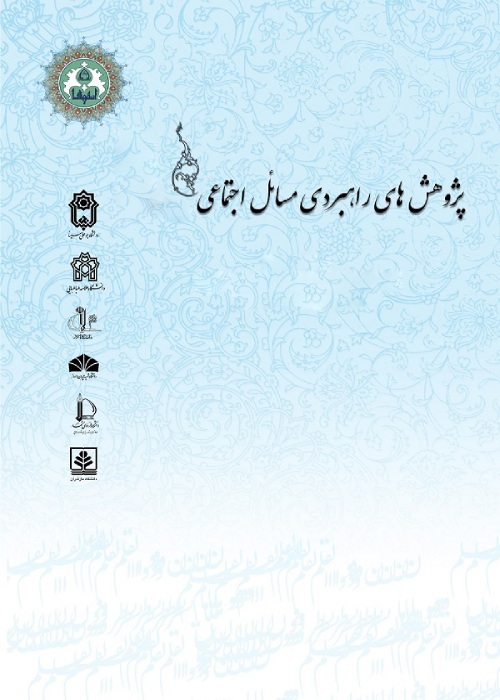Construction and Validation of Citizenship Behavior Questionnaire for Students
From a social psychology perspective, a citizen, who possesses awareness of their own rights and the rights of society, understands themselves as a member of society, and comprehends the broader societal objectives, has a responsibility to fulfill their obligations towards that society. In the 21st century, citizenship encompasses not only knowledge of one's rights but also the willingness to act independently, ensuring that decisions and behavior consistently reflect moral considerations, social justice, and human dignity. Citizenship encompasses various dimensions, including political, civil, social, environmental, and sustainability. Additionally, the expansion of virtual spaces and media has given rise to new dimensions known as media and digital citizenship within the realm of modern citizenship. An important aspect to consider after discussing the comprehensive dimensions of modern citizenship is that, despite the increasing focus of scientific societies on citizenship education in recent years, it remains challenging to assess the impact of citizenship education without a suitable and comprehensive measurement tool, particularly for Iranian society. A review of available tools from outside of Iran reveals that each tool only addresses a specific aspect of citizenship behaviors. Most of these tools prioritize dimensions, such as attitude, thinking, and knowledge, often neglecting the behavioral dimension. Therefore, the purpose of this study was to construct and validate a citizenship behavior questionnaire that could encompass inclusive and comprehensive dimensions for students. By implementing this validated tool before and after educational interventions, it could be utilized to evaluate citizenship across various domains and assess the effectiveness of educational interventions.
To develop a questionnaire for measuring citizenship behaviors across political, civil, social, environmental, sustainable development, media, and digital dimensions, relevant items were selected from the most suitable existing questionnaires in this field. A comprehensive set of questions was created for each dimension and duplicate items were eliminated. Attitude items were modified to measure behavior and supplementary questions were combined. The resulting questionnaire consisted of 106 items, which were then reviewed by 5 experts in the field to assess content and form validity.The target population for this research comprised students from Isfahan universities during the first half of the academic year 2022-2023. Multi-stage cluster sampling was employed to select the participants. A total of 579 individuals completed the questionnaire, but 22 incomplete responses were excluded from the analysis. Therefore, 557 questionnaires were considered complete and suitable for analysis. A scoring system was established, where a score of 1 represented "never" and a score of 4 represented "always," except for items 30 and 85, which were reverse-scored.
The majority of participants in this study were female students, who were single, with an average age of 22.99 years. Following the criterion of factor load in the revision process, several items were removed from the questionnaire. Specifically, Question 3 from the political section, Question 8 from the civil section, Question 30 from the social section, and Questions 51 and 65 from the environment and sustainable development section were eliminated. Additionally, Item 94 from the media section and Items 71, 80, and 85 from the digital section were removed. In the subsequent step, Item 86 was also excluded.Exploratory factor analysis was then conducted using the Varimax rotation method. The analysis results obtained through Amos software, version 24, indicated the suitability of the questionnaire (CMIN=1035.408, df=318, P=0.000, IFI=0.910, CFI=0.909, TLI=0.886, RMSEA=0.064, and PCLOSE=0.011). The reliability of the questionnaire and its respective dimensions was assessed using Cronbach's alpha, a measure of internal consistency and reliability. The overall Cronbach's alpha for the political dimension was 0.603 with values ranging from 0.567 to 0.654 for its individual dimensions. The civil dimension had a Cronbach's alpha of 0.760, while the social dimension had an overall alpha of 0.862 with values ranging from 0.436 to 0.807 for its dimensions. The environment and sustainable development dimension had an overall alpha of 0.887 with values ranging from 0.505 to 0.796 for its dimensions. The media dimension had an overall alpha of 0.714 with values ranging from 0.385 to 0.615 for its dimensions. Lastly, the digital dimension had an overall alpha of 0.853 with values ranging from 0.699 to 0.806 for its dimensions. To assess convergent validity, 4 questionnaires were administered simultaneously, yielding favorable correlation results. This research aimed to develop and preliminarily validate a comprehensive citizenship questionnaire for students. Based on the results of this questionnaire, which consisted of 6 sections, the dimensions of political citizenship included 6 questions related to participation and persuasion. The civil citizenship section comprised 7 questions. The social citizenship section encompassed 28 questions across 7 dimensions, including dealing with others, considering others, dealing with differences, expressing opinions, compatibility, responsible communication, and critical participation. The environmental citizenship and sustainable development section consisted of 18 questions across 4 dimensions, covering topics, such as purchase and consumption, maintenance, education, and attention to nutrition. The media citizenship section included 13 questions across 3 dimensions, focusing on awareness of representation and its impact on the audience, critical evaluation, and awareness for participation. Lastly, the digital citizenship section comprised 23 questions across 4 dimensions, including ethics and responsibilities, online participation, digital literacy, and learning.
It is hoped that with the utilization of this constructed and introduced questionnaire, it will be possible to assess the state of citizenship behavior and ensure the effectiveness of education in this domain.
: Scale , political , Civil , social , Environment , Sustainable Development , Media , Digital , students
- حق عضویت دریافتی صرف حمایت از نشریات عضو و نگهداری، تکمیل و توسعه مگیران میشود.
- پرداخت حق اشتراک و دانلود مقالات اجازه بازنشر آن در سایر رسانههای چاپی و دیجیتال را به کاربر نمیدهد.



